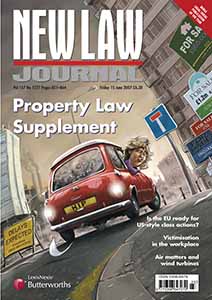
Does the small claims restricted costs regime override a contractual entitlement to costs...
Shierson v Rastogi [2007] EWHC 1266 (Ch), [2007] All ER (D) 446 (May)
Hilali v Governor of Whitemoor Prison [2007] EWHC 939 (Admin); [2007] All ER (D) 210 (Apr)
Taxing times as Law Lords consider Jones v Garnett
CPS v P [2007] EWHC 1144 (Admin)
Elizabeth Fitzgerald and Greville Healey discuss the construction of leases and the property rights of cohabiting couples
Fenton v Holmes [2007] All ER (D) 12 (Jun)
The controversial Child Support Agency (CSA) is to be replaced by C-MEC, a body with greatly enhanced powers to force non-resident parents to pay child maintenance.
How can employers avoid accusations of victimisation? Elliot Gold investigates
Byrne v Motor Insurers’ Bureau and another [2007] EWHC 1268 (QB), [2007] All ER (D) 03 (Jun)
MOVERS & SHAKERS

NLJ Career Profile: Ken Fowlie, Stowe Family Law
Ken Fowlie, chairman of Stowe Family Law, reflects on more than 30 years in legal services after ‘falling into law’

Jackson Lees Group—Jannina Barker, Laura Beattie & Catherine McCrindle
Firm promotes senior associate and team leader as wills, trusts and probate team expands

Asserson—Michael Francos-Downs
Manchester real estate finance practice welcomes legal director







